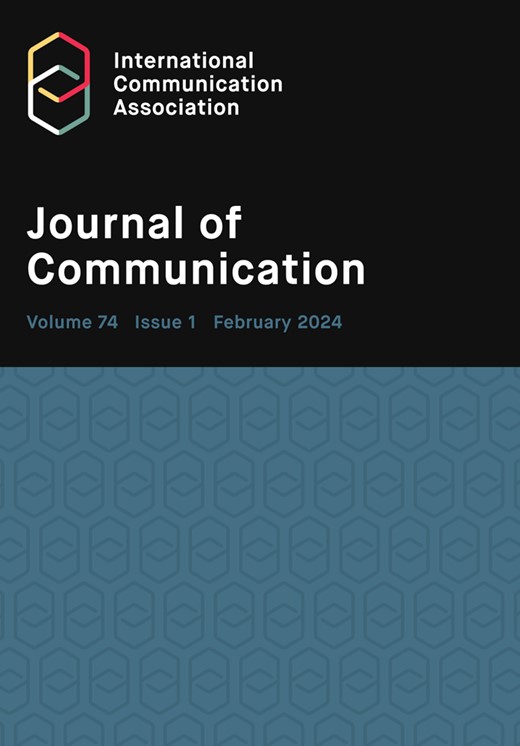Motivations underlying Latino Americans’ group-based social media engagement
IF 5.5
1区 文学
Q1 COMMUNICATION
引用次数: 0
Abstract
Guided by the Social Identity Model of Collective Action, the current research utilizes a three-wave longitudinal study collected pre and post the 2020 U.S. Presidential election to examine the motivations underlying Latino Americans’ group-based social media engagement (N = 1,050). Results revealed that Time 1 group (Latino) identity increased Time 2 perceptions of social media as efficacious in improving group outcomes, which in turn increased Time 3 group-based social media engagement. Although T1 Latino identification was not significantly associated with T2 perceptions of personal or group-based injustice, the former (but not the latter) increased T3 group-based social media engagement. Our findings reflect that marginalized group members engage with social media in part because they believe it is efficacious in improving their disadvantageous group status. This may be an especially attractive strategy for those who face individual experiences of unjust treatment.拉丁裔美国人基于群体的社交媒体参与背后的动机
在集体行动的社会认同模型的指导下,目前的研究利用2020年美国总统大选前后收集的三波纵向研究来研究拉丁裔美国人基于群体的社交媒体参与的动机(N = 1050)。结果显示,时间1组(拉丁裔)的身份增加了时间2对社交媒体有效改善小组结果的看法,这反过来又增加了时间3组基于社交媒体的参与。虽然T1拉丁裔认同与T2个人或群体不公正的感知没有显著相关,但前者(而不是后者)增加了T3群体的社交媒体参与度。我们的研究结果表明,边缘群体成员使用社交媒体的部分原因是他们认为这能有效地改善他们的弱势群体地位。对于那些个人经历过不公正待遇的人来说,这可能是一个特别有吸引力的策略。
本文章由计算机程序翻译,如有差异,请以英文原文为准。
求助全文
约1分钟内获得全文
求助全文
来源期刊

Journal of Communication
COMMUNICATION-
CiteScore
11.60
自引率
5.10%
发文量
41
期刊介绍:
The Journal of Communication, the flagship journal of the International Communication Association, is a vital publication for communication specialists and policymakers alike. Focusing on communication research, practice, policy, and theory, it delivers the latest and most significant findings in communication studies. The journal also includes an extensive book review section and symposia of selected studies on current issues. JoC publishes top-quality scholarship on all aspects of communication, with a particular interest in research that transcends disciplinary and sub-field boundaries.
 求助内容:
求助内容: 应助结果提醒方式:
应助结果提醒方式:


